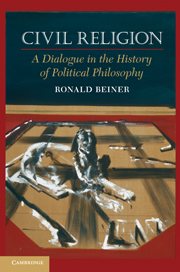Book contents
- Frontmatter
- Contents
- Preface and Acknowledgments
- Introduction
- Part I Machiavelli, Hobbes, Rousseau
- 1 Rousseau's Problem
- 2 The Machiavellian Solution
- 3 Moses and Mohammed as Founder–Princes or Legislators
- 4 Refounding and “Filiacide”
- 5 The Hobbesian Solution
- 6 Behemoth
- 7 Geneva Manuscript
- 8 Social Contract
- Part II Responses to (and Partial Incorporations of) Civil Religion within the Liberal Tradition
- Part III Theocratic Responses to Liberalism
- Part IV Postmodern “Theism”
- Conclusion
- Index
- References
8 - Social Contract
The Ultimate Unavailability of a Rousseauian Solution
Published online by Cambridge University Press: 05 June 2012
- Frontmatter
- Contents
- Preface and Acknowledgments
- Introduction
- Part I Machiavelli, Hobbes, Rousseau
- 1 Rousseau's Problem
- 2 The Machiavellian Solution
- 3 Moses and Mohammed as Founder–Princes or Legislators
- 4 Refounding and “Filiacide”
- 5 The Hobbesian Solution
- 6 Behemoth
- 7 Geneva Manuscript
- 8 Social Contract
- Part II Responses to (and Partial Incorporations of) Civil Religion within the Liberal Tradition
- Part III Theocratic Responses to Liberalism
- Part IV Postmodern “Theism”
- Conclusion
- Index
- References
Summary
The general opinion [concerning Rousseau] indeed, was, that he had too much philosophy to be very devout, and had too much devotion to have much philosophy.
In Meaning in History, Karl Löwith writes the following (in the context of a discussion of Vico):
Rousseau's alternative that the political religions of antiquity were useful but false, while Christianity is true but socially useless, did not occur to [Vico]. Hence he could also be unconcerned about Rousseau's attempt at a synthesis between the universal (Christian) religion of “man” and that of the “citizen” in a new kind of Christian “civil religion.”
Indeed, in the Geneva Manuscript Rousseau does claim of his projected civil religion that “the advantages of the religion of man and the citizen will be combined. The State will have its cult and will not be the enemy of anyone else's.” The Social Contract, however, claims no such thing, and if our reading of Rousseau presented here has been a faithful one, then Rousseau was entirely right to retract the Geneva Manuscript's overly ambitious promise of a synthesis of Christianity and paganism. Of our three authors in Part I, the only one who really wanted a synthesis of “the religion of man” and “the religion of the citizen” was surely Hobbes, in the sense that Hobbes genuinely abhorred the pagan politics that tempted both Machiavelli and Rousseau, and therefore sought to temper the harshness of that politics with what both Machiavelli and Rousseau saw as the “slavishness” of Christianity. (To confirm this point, one need merely imagine how Hobbes would react to Machiavelli's and Rousseau's celebrations of Rome.)
Let us now see if we can get in a clearer focus Rousseau's relation to the two predecessors in whose shadow the discussion of civil religion is conducted. First, Machiavelli: As Lionel McKenzie helpfully points out, Rousseau, in Social Contract, Book II, chapter 7, offers a veiled criticism of Machiavelli's blatantly cynical version of civil religion in, for instance, Discourses I.14. Rousseau wants a legislator who not merely hoodwinks the people with pagan tricks, but who embodies a “wisdom” that genuinely bespeaks “divine authority.” “The legislator's great soul is the true miracle that should prove his mission.” Yet the final sentence of Social Contract II.7 shows that the larger enterprise remains Machiavellian: “One must not conclude from all this, as Warburton does, that politics and religion have a common object for us, but rather that at the origin of nations, one serves as an instrument of the other.” I think McKenzie misses the real meaning of Rousseau's correction of Machiavelli. What's really going on in Social Contract II.7 is that Rousseau realizes that Machiavelli undermines his own civil-religion enterprise by being so explicit about the con worked by religion. Thus Rousseau is obliged to keep alive the civil-religion project by undoing Machiavelli's cold cynicism. However, whether the civil-religion project is ultimately salvageable is the question raised by the discussion that follows.
- Type
- Chapter
- Information
- Civil ReligionA Dialogue in the History of Political Philosophy, pp. 78 - 84Publisher: Cambridge University PressPrint publication year: 2010



